Why create a profile on Shaalaacom?U}{\partial x \partial y} \; There's a factor of 2 missing in all your second derivatives The result is exactly as you'd expect The variable you're differentiating with respect to, matters If it's x, then y is treated as a constant, and vice versa So if the "active" variable is leading in the numerator in one derivative, the same should apply in the other

How To Do Implicit Differentiation 7 Steps With Pictures
Partial derivative of log(x^2+y^2)
Partial derivative of log(x^2+y^2)-1 Inform you about time table of exam 2 Inform you about new question papers 3 New video tutorials informationOrder Now How do you find the derivative of ##y= log x^2##?



M Zk4ndqg9calm
U}{\partial y \partial x} $Find the derivative of the function y = f(x) using the derivative of the inverse function x = f–1(y) in the following y = log(2x – 1) Maharashtra State Board HSC Science (General) 12th Board Exam Question Papers 231 Textbook Solutions Online Tests 73 Important Solutions 3704 Question Bank Solutions Concept Notes & Videos 721 Time Tables 24 SyllabusView more examples » Access instant learning tools Get immediate feedback and guidance with stepbystep solutions and Wolfram Problem Generator Learn more about Stepbystep solutions » Wolfram Problem Generator » VIEW ALL CALCULATORS BMI Calculator;
To ask Unlimited Maths doubts download Doubtnut from https//googl/9WZjCW derivative of `x^2y^2 = log(xy)`Since y 2 y 2 is constant with respect to x x, the derivative of y 2 y 2 with respect to x x is 0 0 1 x 2 y 2 ( 2 x 0) 1 x 2 y 2 ( 2 x 0) Combine fractions Tap for more steps Add 2 x 2 x and 0 0 1 x 2 y 2 ( 2 x) 1 x 2 y 2 ( 2 x) Combine 2 2 and 1 x 2 y 2 1 x 2 y 2 2 x 2 y 2 x 2 x 2 y 2 xDerivative of arctanx at x=0;
Calculus Find the Derivative d/dx y = log base 2 of x y = log2 (x) y = log 2 ( x) The derivative of log2(x) log 2 ( x) with respect to x x is 1 xln(2) 1 x ln ( 2) log〗𝑥 )^2 (𝑑^2 𝑦)/(𝑑𝑥^2 ) = (− (𝑑 (〖𝑥 log〗𝑥 ))/𝑑𝑥)/(〖𝑥 log〗𝑥 )^2 using Quotient Rule As, (𝑢/𝑣)^′= (𝑢'𝑣 − 𝑣'𝑢)/𝑣^2 where u = 1 & v = x log x (𝑑^2 𝑦)/(𝑑𝑥^2 ) = (−(𝑑(𝑥))/𝑑𝑥 log𝑥 (𝑑(log〖𝑥)〗)/𝑑𝑥 𝑥)/(〖𝑥 log〗𝑥 )^2 (𝑑^2 𝑦)/(𝑑𝑥^2 ) = 1log〖𝑥 1/𝑥 × 𝑥〗 /( (𝑥log𝑥 )^2 ) (𝑑^2 𝑦Derivative of x/(x^2y^2) by x = (y^2x^2)/(y^42*x^2*y^2x^4) Show a step by step solution;




Diploma Engineering Mathematics Notes




What Is The Degree Of The Following Differential Equation 5x Dy Dx 2 D 2y Dx 2 6y Log X
I'have been trying to calculate the last partial derivative but did not get the correct answer My teacher's answer is $4xy/(x^2y^23)^2$ Can you please explain how we got it?Derivative Of X 2 Y 2 Log Xy Youtube For more information and source, see on this link https//wwwyoutubecom/watch?v=kK2UW4FYL5gThe Derivative Of Log X Tan X Derivative Product Rule Calculus Download Image Derivatives Of Logarithmic And Exponential Functions Is An Download Image Find Dy Dx Given Parametric Equations X Sin 2 Theta Y Cos 2 Download Image The Derivative Of Log X Sin X Sins Product Rule Calculus Download Image Derivative Of Exponential Function For More Solutions To




Derivatives Of Logarithmic Functions Objective Obtain Derivative Formulas For Logs Ppt Download



Http Maths Dur Ac Uk Users Daniel Evans Mes Messolutionsupdated Pdf
Draw graph Edit expression Direct link to this page Value at x= Derivative Calculator computes derivatives of a function with respect to given variable using analytical differentiation and displays a stepbystep solution It allows to draw graphs of the function and its derivatives CalculatorDerivative Of X 2 Y 2 Log Xy Youtube For more information and source, see on this link https//wwwyoutubecom/watch?v=kK2UW4FYL5gY =log(sinx2)sinx2 = uTherefore by applying chain rule,dxdy = dudlogu ∗ dxdsinx2 dxdy = u1 ∗cosx2 = sinx21 ∗cosx2 = cotxTherefore,dxdy = cotx
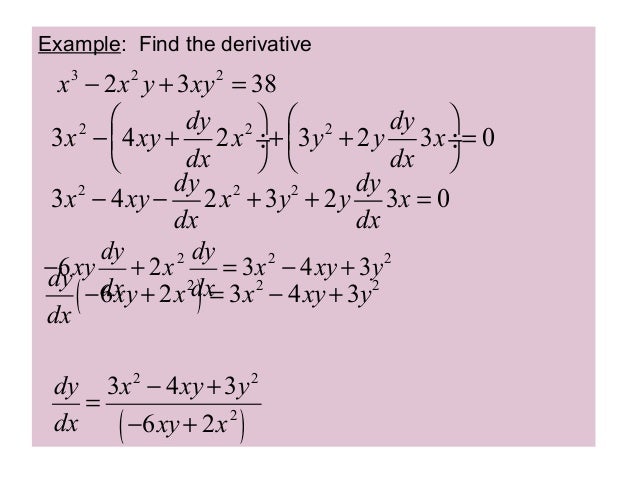



4 2 Derivatives Of Logarithmic Functions




What Is The Derivative Of Log X Square
Share It On Facebook Twitter Email 1 Answer 2 votes answered by Reyansh (191k points) selected by faiz Best answer log(x √x 2 1) ← Prev Question Next Question → Related questions 0 Your answer seems true $$2x2yy'=2(2x^22y^2x)(4x4yy'1),$$ but there is a mistake in your nominator It should be $$y'=\frac{2(4x^33x^2y^24xy^2)}{y(8y^28x^24xآلات حساب للجبر، حساب التفاضل والتكامل، هندسة، إحصاء، وكيمياء مع شرح
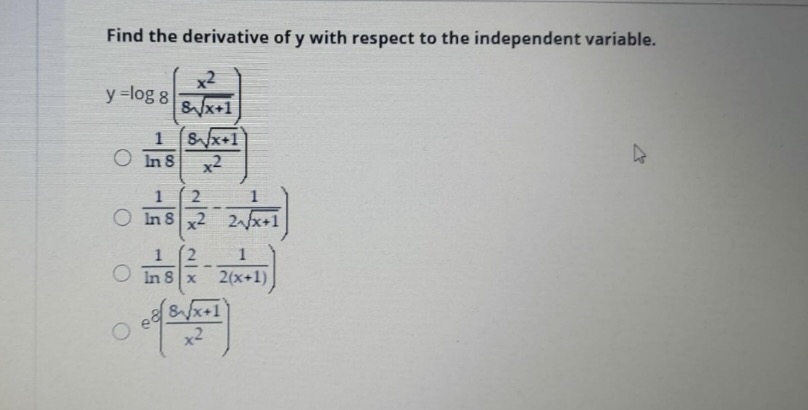



Answered Find The Derivative Of Y With Respect Bartleby




Solution Differentiate Y Log 10 X 2 2 2
Given, y = x − x 2 On differentiating wrt x, we get d x d y = 1 − 2 x Now, d (x 2) d (y 2) = d (x 2) d x d (y 2) d (x) = 2 x 2 y d x d y = 2 y 2 x (1 − 2 x) = 2 x 2 (x − x 2) (1 − 2 x) = (1 − x) (1 − 2 x) = 1 − 3 x 2 x 2 = 2 x 2 − 3 xWatch Video in App This browser does not support the video element 723 k 36 k Answer Step by step solution by experts to help you in doubt clearance & scoring excellent marks in exams Related Videos View All 2Derivative Of X 2 Y 2 Log Xy Youtube For more information and source, see on this link https//wwwyoutubecom/watch?v=kK2UW4FYL5g




Ex 5 7 4 Find Second Order Derivatives Of Log X Teachoo




If Y Log7 Log X Find Dydx
Answered 3 years ago Log e^x {x2/x2}^3/4 Since log (mn)=log (m )log (n) & log (x^n)=log (x)^n Therefore it becomes x3/4 {log (x2) log (x2)}loge=1 d (x)/dx3/4 {d (log (x2)/dx d (log (x2)/dx 13/4 {1/x2 1/x2}Solve your math problems using our free math solver with stepbystep solutions Our math solver supports basic math, prealgebra, algebra, trigonometry, calculus and more Differentiate y=log_10〖(x^22)^2 〗 Pinoybixorg is an engineering education website maintained and designed toward helping engineering students achieved their ultimate goal to become a fullpledged engineers very soon




Problems On Partial Differentiation U Log X 2 Y 2 Z 2 U Tan 1 2xy X 2 Y 2 Z F X Ay Q X Ay Youtube



M Zk4ndqg9calm
Achtunglog natürlicher Logarithmus Zeichnen Bearbeiten Direkter Link zu dieser Seite Wert bei x= Der Ableitungsrechner berechnet die Ableitung einer Funktion in Bezug auf gegebene Variable mittels analytischer Differenzierung Ableitungen bis zur 10 Ordnung werden unterstützt DerTo ask Unlimited Maths doubts download Doubtnut from https//googl/9WZjCW Derivative of `log(xsqrt(x^2a^2)) wrtx` is If y = log(tan (x/2)), find dy/dx ← Prev Question Next Question → 0 votes 771k views asked in Mathematics by Samantha (3k points) If y = log(tan (x/2)), find dy/dx continuity and differntiability;




No Links Please Second Order Derivative Q 24 Eliminate A And B I Y A Log X B Ans Maths Application Of Derivatives Meritnation Com



If Y Log Tan X 2 Find Dy Dx Sarthaks Econnect Largest Online Education Community
Derivative of the Logarithm Function y = ln x The derivative of the logarithmic function y = ln x is given by `d/(dx)(ln\ x)=1/x` You will see it written in a few other ways as well The following are equivalent `d/(dx)log_ex=1/x` If y = ln x, then `(dy)/(dx)=1/x`Free PreAlgebra, Algebra, Trigonometry, Calculus, Geometry, Statistics and Chemistry calculators stepbystep##d/dx(log(x^2))=2/x## From the properties of log function we know that, ##log(x^n)=n*log(x)## Applying this property to given problem ##log(x^2)## may be Course Scholar Home ;




Ex 5 7 10 Find Second Order Derivatives Of Sin Log X




Ex 5 5 7 Differentiate The Function Log X X X Log X
Ex 55, 7 Differentiate the functions in, 〖(log〖𝑥)〗〗^𝑥 𝑥^log𝑥 Let 𝑦 = 〖(log〖𝑥)〗〗^𝑥 𝑥^log𝑥 Let 𝑢 = 〖(log〖𝑥)〗〗^𝑥 , 𝑣 = 𝑥^log𝑥 𝑦 = 𝑢𝑣 Differentiating both sides 𝑤𝑟𝑡𝑥 𝑑𝑦/𝑑𝑥 = (𝑑 (𝑢 𝑣))/𝑑𝑥 𝑑𝑦/𝑑𝑥 = 𝑑𝑢/𝑑𝑥 𝑑𝑣/𝑑𝑥Derivative of x^2y^2 = log(xy) Updated On 47 To keep watching this video solution for FREE, Download our App Join the 2 Crores Student community now! dy/dx=2/x There are 2 possible approaches color(blue)"Approach 1" differentiate using the color(blue)"chain rule" color(red)(bar(ul(color(white)(2/2)color(black)(d/dx(log(f(x)))=1/(f(x))f'(x))color(white)(2/2)))) y=log(x^2) rArrdy/dx=1/x^2d/dx(x^2)=1/x^2 xx2x=2/x color(blue)"Approach 2" Using the color(blue)"law of logs" then differentiate color(orange)"Reminder " color(red)(bar(ul(color(white)(2/2)color(black)(logx^n=nlogx)color(white)(2/2)))) y=logx^2




Derivative Calculator With Steps




Ad Eng Math 6 8 15 Pages 51 100 Flip Pdf Download Fliphtml5
Since log (mn)=log (m )log (n) & log (x^n)=log (x)^n Therefore it becomes x3/4 {log (x2) log (x2)}loge=1 d (x)/dx3/4 {d (log (x2)/dx d (log (x2)/dx 13/4 {1/x2 1/x2} 13/4 {x2 (x2) /x^24 } 13/4 (x2 x 2 / x^24)Solution \{y'\left( x \right) = {\left {{{\log }_3}\left( {4{x^2}} \right)} \right^\prime } } = {\frac{1}{{4{x^2}\ln 3}} \cdot {\left( {4{x^2}} \right)^\prime } }Y = 2t 1 t, then d2y dx2 = 9 If f(x) = {e3x − 1 4x forx ≠ 0 k x 4 for x = 0 is continuous at x = 0, then k =




The Derivative Of Y Log X For Any Positive Base A Youtube




1 Pages 1 33 Flip Pdf Download Fliphtml5
(with a solution) I've been trying using the general quotient rule and the output was a total mess My exam is in 5 hours ) Thanks!Answer to Evaluate the gradient of f(x, y, z) = \log (x^2 y^2 z^2) at (1, 0, 1) By signing up, you'll get thousands of stepbystepIf y = logtan(π 4 x 2), then dy dx = 6 If y = sin2(tan − 1√1 − x2 1 x2), then dy dx = 7 If √x y √y x = √a , then dy dx = 8 If x = 1 − t 1 t;




Find Nth Derivative Of Log X 2 A 2 Brainly In



What Is The Derivative Of Log 2x Log 3x And Log 4x Quora
We have to find the derivative of log x Solution We define log functions as the inverses of exponentials y = ln(x) ⇔ x=e y y=log a (x) ⇔ x=a y Since we know how to differentiate exponentials, we can use implicit differentiation to find the derivatives of ln(x) and loga(x) d/ dx ln(x) = 1/x d/ dx log a (x)= 1/ x ln a AnswerNext substitute u= (x^2 1)^3, meaning du/dx = 6x (x^2 1)^3 Again you can you can use chain rule for the derivative of (x^2 1)^3 by substituting another variable or just taking the derivative of the inside and outside And similarly since log_e u = y => dy/du =Second derivative of sin^2;




Finding The Derivative Of Log X Video Lesson Transcript Study Com
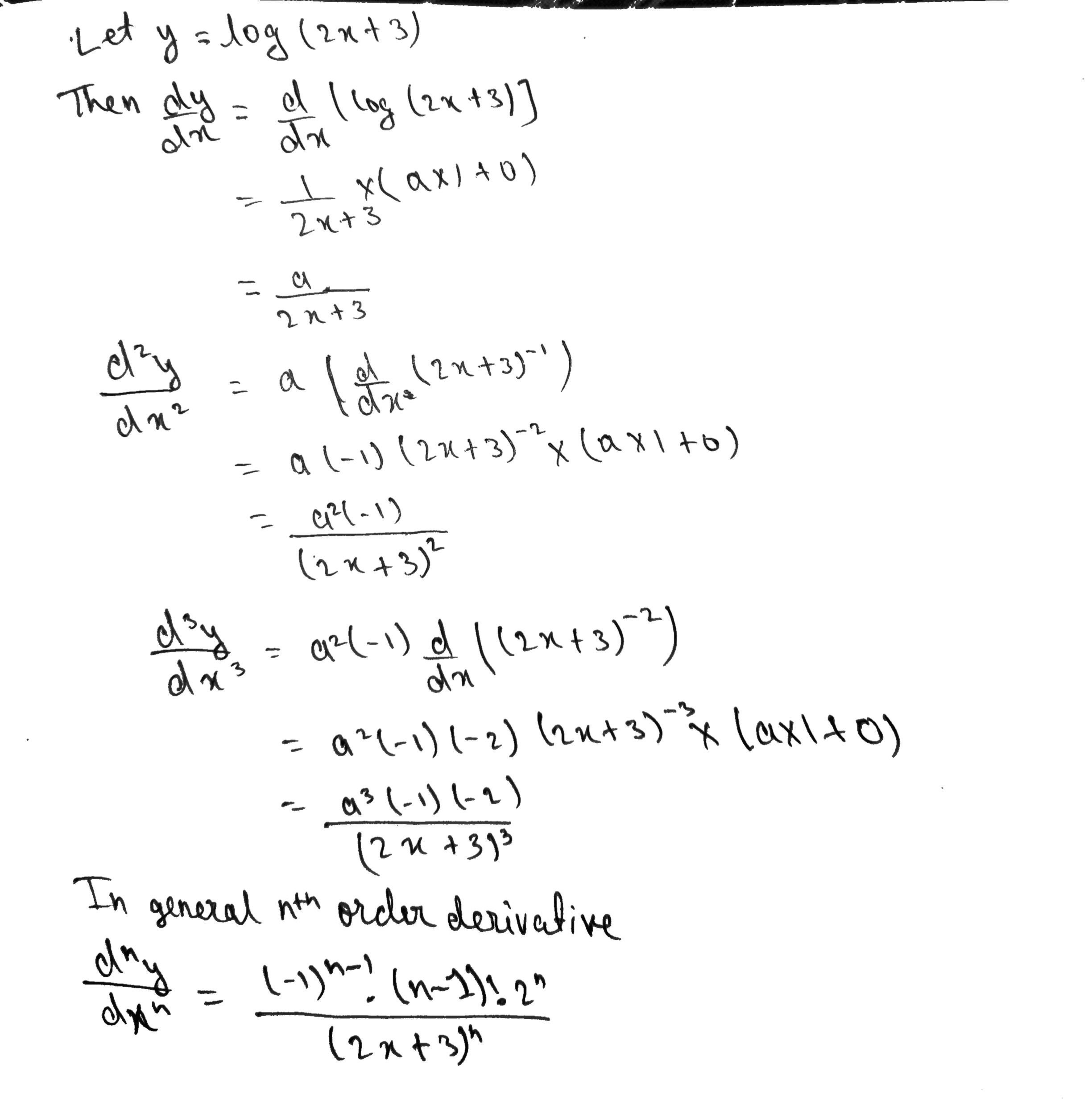



Find The N Th Derivative Of The Following Log 2x 3
Solve your math problems using our free math solver with stepbystep solutions Our math solver supports basic math, prealgebra, algebra, trigonometry, calculus and moreSolution Let y = x^2 log x log y = log x^2 log (log x) (1/y)dy/dx = 2x/x^2 (1/log x) (1/x)Find d2y/dx2 where y=log(x^2/e^2) y=log(x 2 /e 2 ) diff wr to x , we get dy/dx=1/(x 2 /e 2 ) (2x/e 2 ) =2/x diff wr to x again d 2 y/dx 2 =2/x 2 Thank
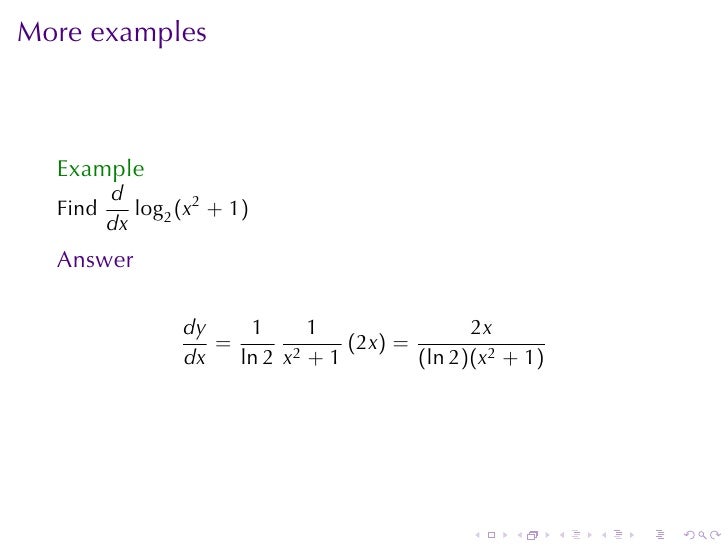



Lesson 16 Derivatives Of Logarithmic And Exponential Functions



5 Derivative Of The Logarithmic Function
Find the derivative of log(x √x 2 1) class12;We shall prove the formula for the derivative of the natural logarithm function using definition or the first principle method Let us suppose that the function is of the form y = f ( x) = log a x First we take the increment or small change in the function y Δ y = log a ( x Δ x) Δ y = log a ( x Δ x) – yWhat is the derivative of x^2 log x?



If X Y E X Y Show That Dy Dx Logx Log Xe 2 Sarthaks Econnect Largest Online Education Community
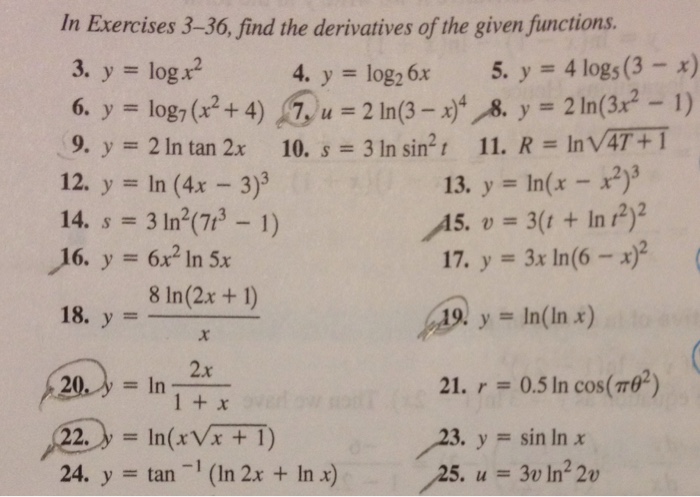



Find The Derivatives Of The Given Functions Y Log Chegg Com
Taking advantage of the fact that $y = \log_a{x}$ can be rewritten as an exponential equation, $a^y = x$, we can state the derivative of $\log_a{x}$ asBasic partial derivatives u = log( $x^2$ $y^2$ ), prove $ \frac{\partial^2 \;Derivative\of\f (x)=34x^2,\\x=5 implicit\derivative\\frac {dy} {dx},\ (xy)^2=xy1 \frac {\partial} {\partial y\partial x} (\sin (x^2y^2)) \frac {\partial } {\partial x} (\sin (x^2y^2)) derivativecalculator \frac {d} {dx}\left (e^ {x^2}\right) en Sign In Sign in with Office365




Derivative Of Logₐx For Any Positive Base A 1 Video Khan Academy




Finding The Derivative Of Log X Video Lesson Transcript Study Com
My account Order now Call us 24/7 1 763 309 4299;Share It On Facebook Twitter Email 1 Answer 1 vote answered by Jyoti (303k points) selected by Vikash KumarUncategorized ##d/dx(log(x^2))=2/x## From the properties of log
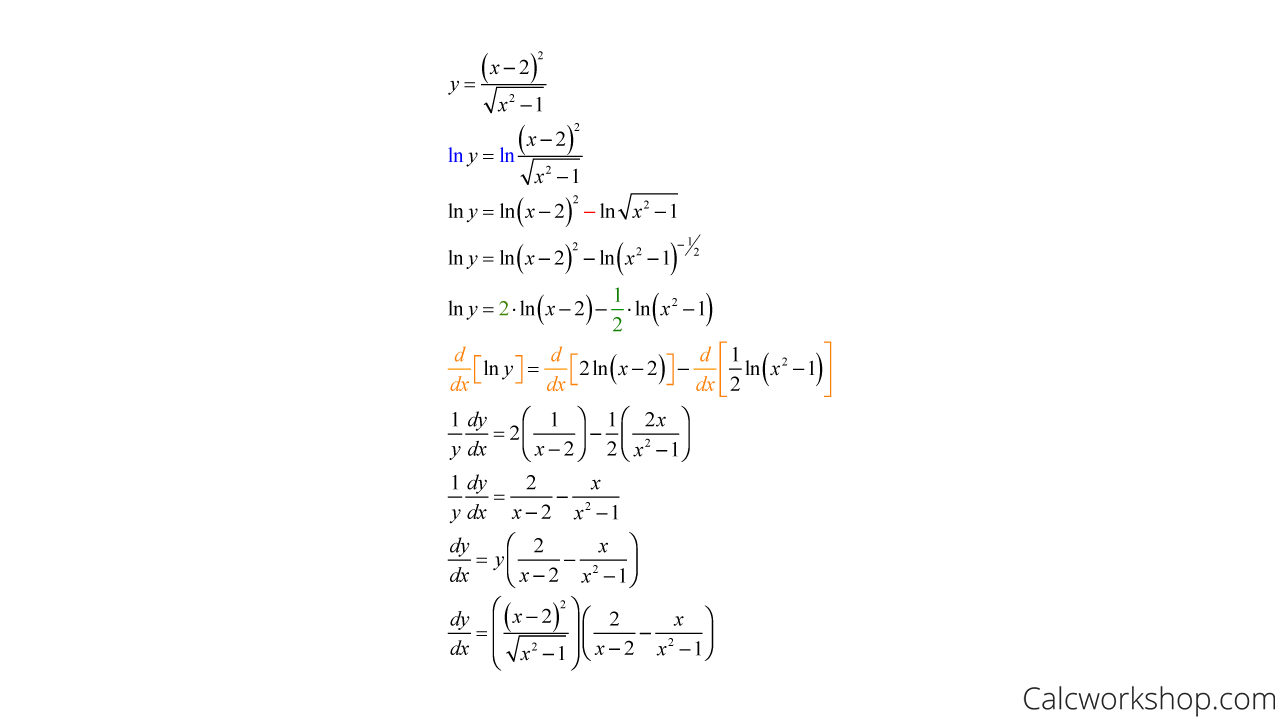



Logarithmic Differentiation W 7 Step By Step Examples




Ex 5 7 9 Find Second Order Derivatives Of Log Log X
Differentiate (x^2 y)/(y^2 x) wrt x;Partial Derivative Formulas and Identities There are some identities for partial derivatives as per the definition of the function 1 If u = f (x,y) and both x and y are differentiable of t ie x = g (t) and y = h (t), then the term differentiation becomes total differentiation 2Know from previous videos that the derivative with respect to X of the natural log of X natural log of X is equal to 1 over X what I want to do in this video is use that knowledge that we've seen in other videos to figure out what the derivative with respect to X is of a logarithm of an arbitrary base so I'm just going to call that log base a of X so how do we figure this out well the key



Solved 1 Compute The Derivative Of Y X 1 X 2 In Two Ways A First Expand And Then Use The Power Rule B Take The Natural Log Of Both Sides The Course Hero




Ipe Material Notes
Answer to Find the derivative y = \log_{7}(x^{2} 6x 2) By signing up, you'll get thousands of stepbystep solutions to your homeworkDerivative von log(x^2y^2) nach x = (2*x)/(y^2x^2) Zeige Schritt für Schritt Lösung;



Q Ix Find The Second Order Derivative Mathematics Topperlearning Com Pdjwi1aa



Find The Derivative Of Log X X Xlog X Stumbling Robot




B Find The Derivative Of Ex Logx G Ans Dy D Gauthmath



5 Derivative Of The Logarithmic Function




Find Second Derivative Of Log X Calculus Youtube



If Y Log X 2 X 1 X 2 X 1 2 3 Tan 1 3x 1 X 2 Find Dy Dx Sarthaks Econnect Largest Online Education Community




Derivative Of Logarithm For Any Base Old Video Khan Academy




Derivative Of Logarithm For Any Base Old Video Khan Academy
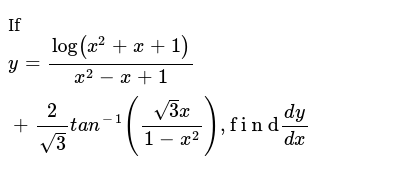



Vi Differentiate Y Log X 3 Sqrt X 2 6x 3 W R T Quad 5
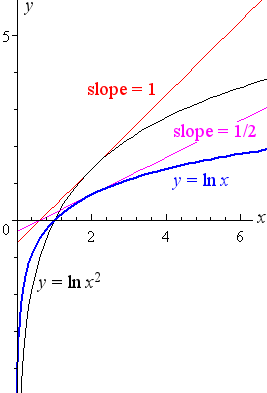



5 Derivative Of The Logarithmic Function



Search Q Differentiation Formula Tbm Isch



Find The Derivative Of Log Log Log X Stumbling Robot
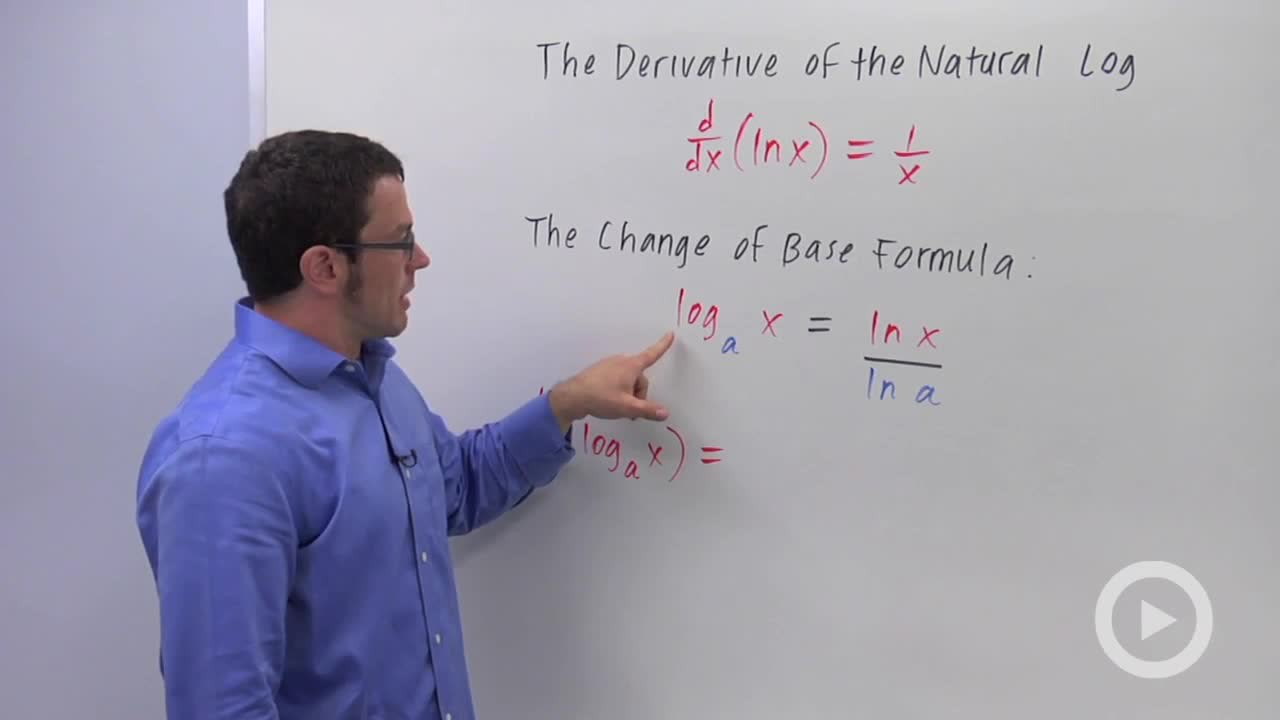



Derivatives Of Logarithmic Functions Problem 3 Calculus Video By Brightstorm




Find Dy Dx When Y E Xlog 1 X 2



Differentiate The Following Function With Respect To X Log 3x 2 X 2log 2x 1 Sarthaks Econnect Largest Online Education Community



Search Q Chain Rule Tbm Isch




How To Do Implicit Differentiation 7 Steps With Pictures



1
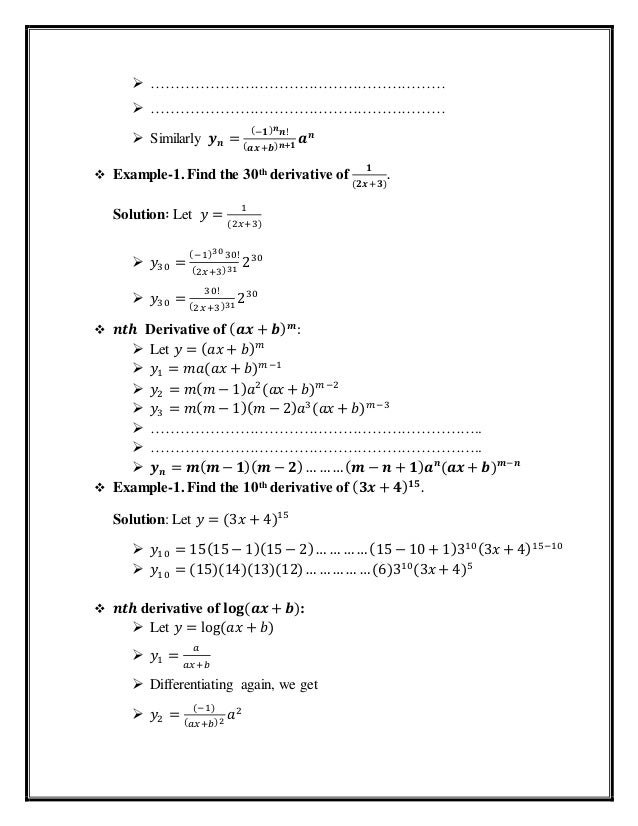



Bsc Computer Science Discrete Mathematics Unit I



What Is The Second Derivative Of Y Log X 2 E X Quora



What Is The Derivative Of Y Log Base 3sinx Quora




If Y Cos Log X Sin Log X Then Prove That X2y2 X Y1 Y 0 Where Y1 And Y2are First And Second Order Derivatives Zigya




Derivative The Following 1 Y Esin L 2 3 2 Y Lo Gauthmath
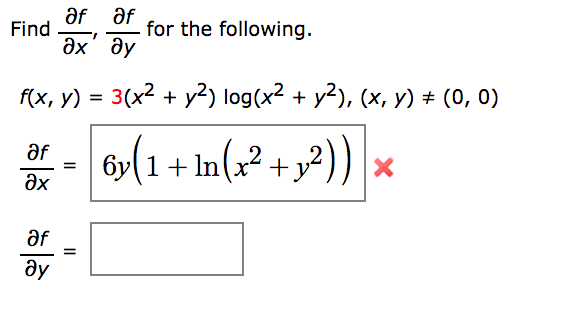



Find Partial Differential F Partial Differential X Chegg Com




Second Derivative Of Y Log Logx Brainly In




Ipe Material Notes




Find Second Order Derivative Of Log Logx Youtube




Q37 If Y Log X X 2 A 2 Then Show That X 2 A 2 D 2 Y Dx 2 X Dy Dx 0 Youtube



How Do You Find The Derivative Of E X Log X Socratic




What Is The Second Derivative Of Y Log X 2 E X Quora




Ipe Material Notes




Ex 5 7 9 Find Second Order Derivatives Of Log Log X



Www Sfgc Ac In Question Papers 17 Bsc 1sem Mathematics I Pdf




Ipe Material Notes




Differentiate Log X X Cosec 2 X W R T X



1



Differentiate Log Log Logx5 W R T X Studyrankersonline




Ex 6 2 7 Show That Y Log 1 X 2x 2 X Is An Increasing Fn
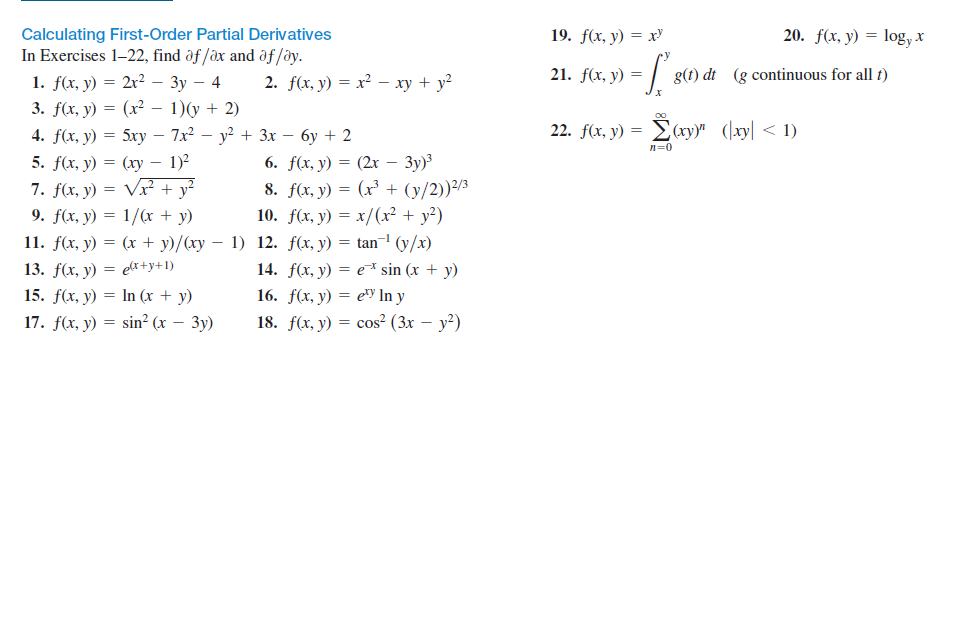



Answered Calculating First Order Partial Bartleby




Ex 5 7 5 Find Second Order Derivatives Of X3 Logx Ex 5 7




Solve This Q If Y Log X X2 1 Show That X2 1d2ydx2 Xdydx 0 Maths Differential Equations Meritnation Com
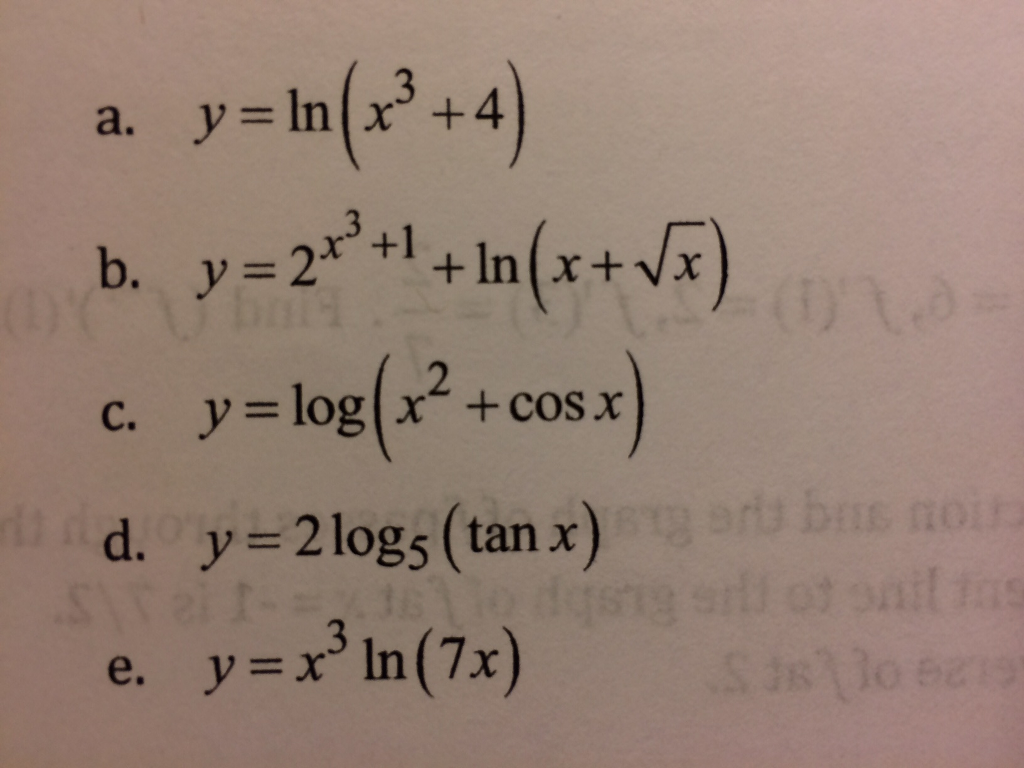



Find The Derivatives Y Ln X 3 4 Y 2 X 3 1 Chegg Com




Help Me Find The Derivative Of Log X X 2 A 2 Brainly In




What Is The Derivative Of X 2 Log X Quora



What Is The Nth Derivative Of Logx Quora



How To Find The Derivative Of 2 Logx Quora
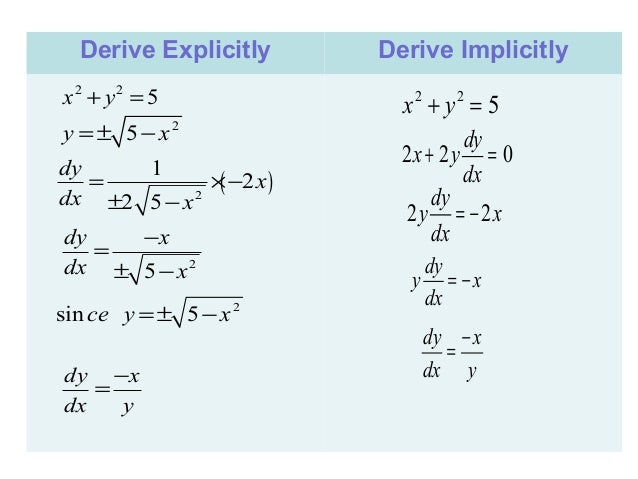



4 2 Derivatives Of Logarithmic Functions




Ipe Material Notes
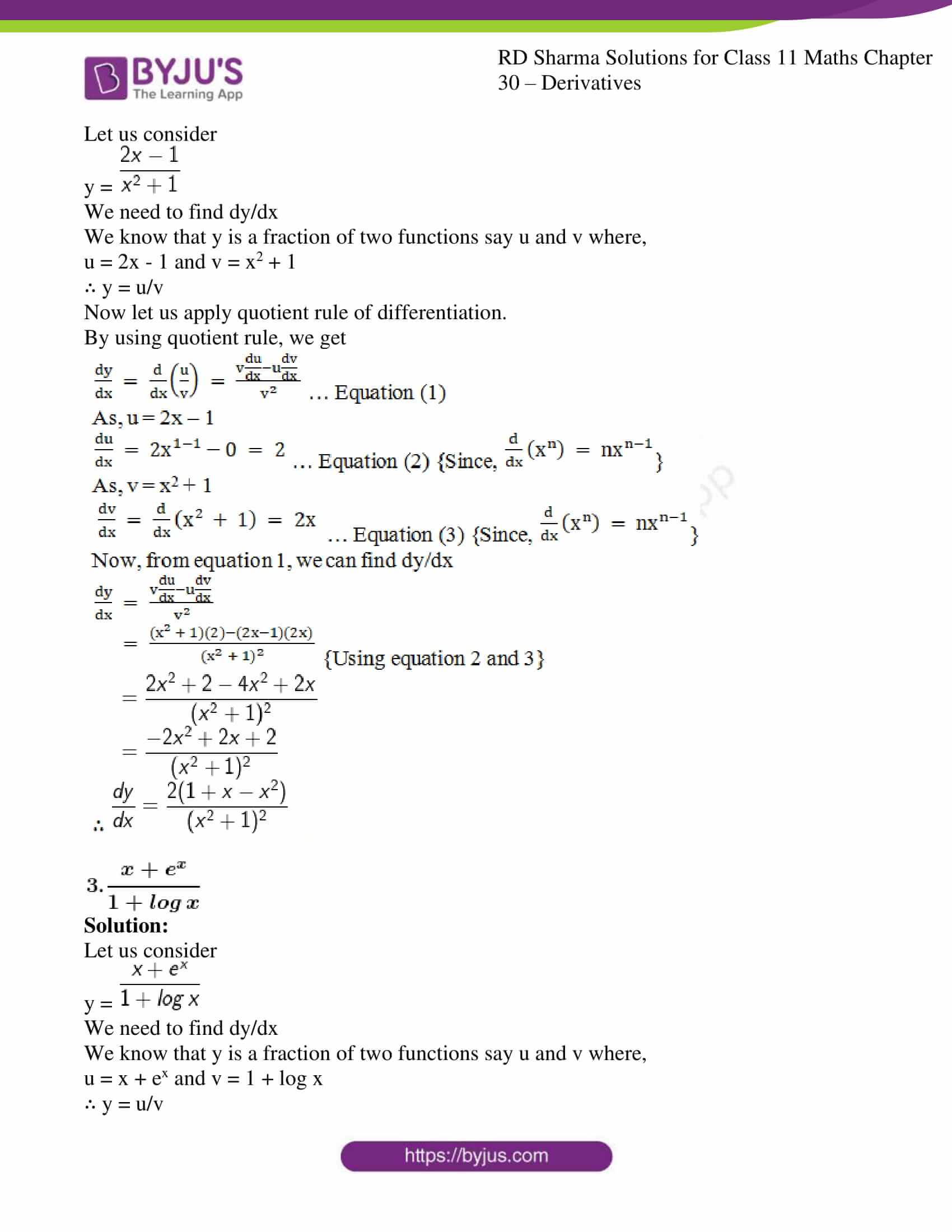



Rd Sharma Solutions For Class 11 Maths Updated For 21 22 Chapter 30 Derivatives Download Free Pdf




Misc 7 Differentiate Log X Log X Chapter 5 Class 12




Ex 5 5 7 Differentiate The Function Log X X X Log X




Q47 If Y Log X X 2 1 Then Prove That X 2 1 D 2 Y Dx 2 X Dy Dx 0 2nd Order Derivatives Youtube
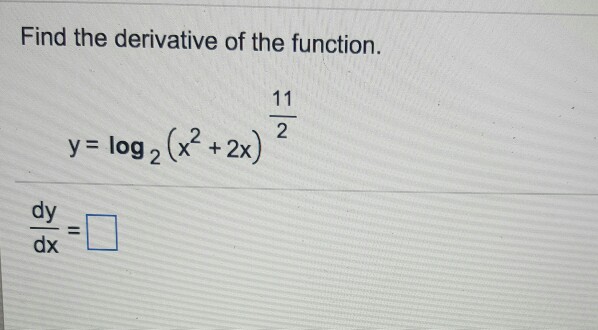



Find The Derivative Of The Function Y Log 2 X2 2x 2 Chegg Com




Derivative Calculator Wolfram Alpha




If Y Logx X Then Show That Second Derivative Of Dy Dx 2logx 3 X 3 Brainly In




Math1 Pages 101 150 Flip Pdf Download Fliphtml5




Derivative Rules




Derivative 2nd Order Learn Mathematics Online




35 Ch5 Continuous Function Logarithm




What Is The Derivative Of Log Y With Respect To X Mathematics Stack Exchange




What Is The Second Derivative Of Y Log X 2 E X Maths Continuity And Differentiability Meritnation Com



What Is The Second Derivative Of Y Log X 2 E X Quora



Differentiate Log X X2 A W R T X Studyrankersonline
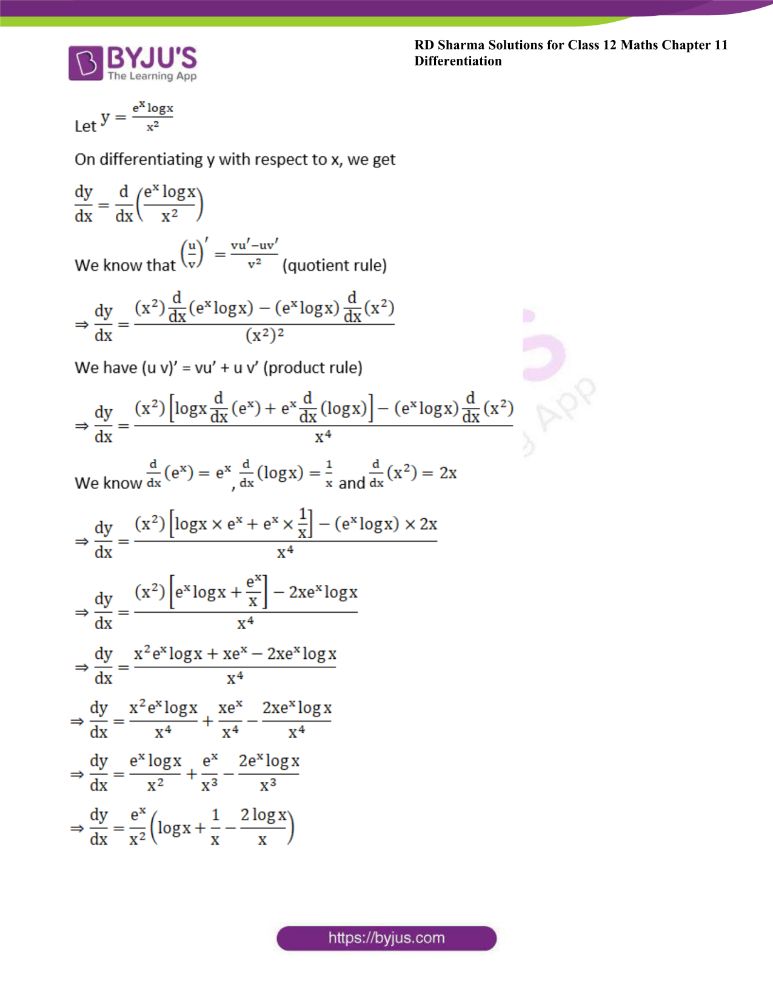



Rd Sharma Class 12 Maths Solutions Chapter 11 Differentiation




Finding The Derivative Of Log X Video Lesson Transcript Study Com




Show That The Following Function U 1 2 Log X 2 Y 2 Is Harmonic And Find Its Harmonic Conjugate Functions Mathematics 2 Question Answer Collection




Determine The Derivative Of Y Log 3 2x X2 Homeworklib




Learning Task 1 Determine The Derivative Of The F Gauthmath



Http Kea Kar Nic In Vikasana Maths Puc E7 Questions Pdf



5 Derivative Of The Logarithmic Function



0 件のコメント:
コメントを投稿